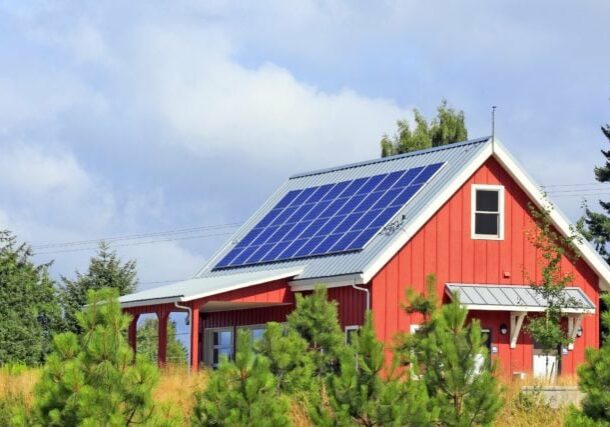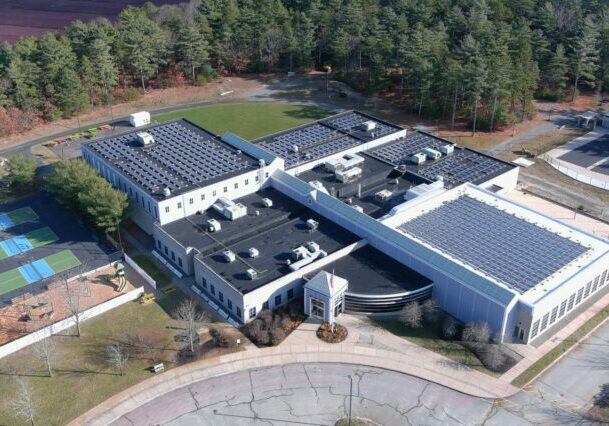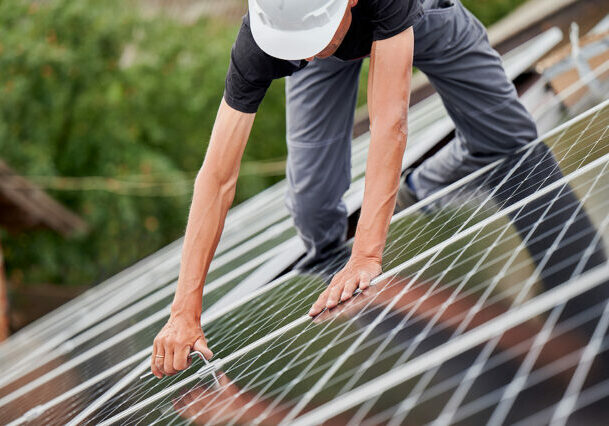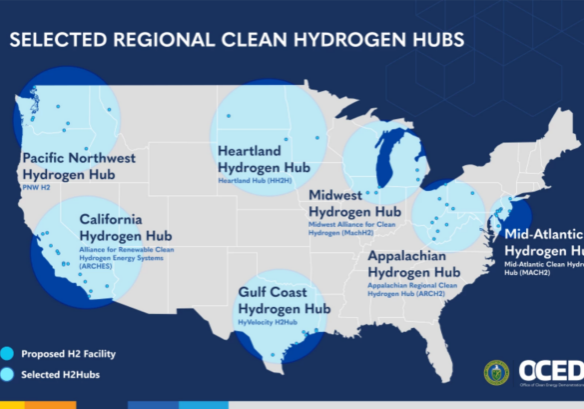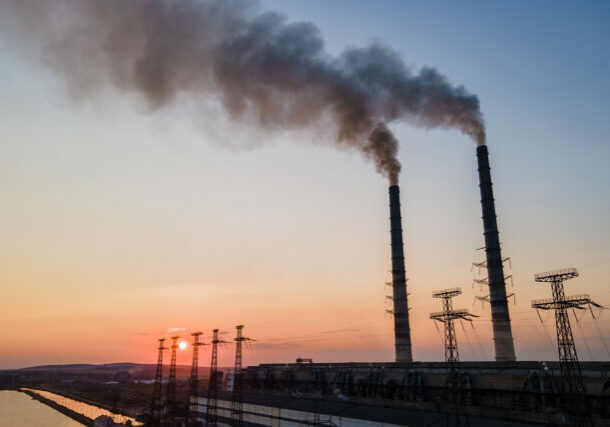December 21, 2022
2022 Year-in-Review: Technical Assistance Fund and Resilient Power Leadership Initiative
By Marriele Mango, Abbe Ramanan
2022 was a banner year for the Technical Assistance Fund (TAF) and Resilient Power Leadership Initiative (RPLI). Clean Energy Group (CEG) awarded $200,000 to 23 community-based organizations (CBOs) and service providers across nine states and Washington, D.C. Over 40 percent of awardees were BIPOC-led organizations, receiving $92,000 of the total funding.
Highlights of this year include new industry, CBO, regional, and municipal partnerships. These partnerships are reflected in the diverse and geographically dispersed recipients of this year’s TAF and RPLI awards. While we remain short of our goal to award 50 percent of funds to BIPOC-led organizations, we continue to evaluate and re-evaluate our efforts to ensure better and more inclusive programs for next year.
Since its inception in 2014, the TAF and RPLI have resulted in over $1.3 million in funding to 112 CBO’s, affordable housing providers, municipalities, and first responders across 26 states, Washington D.C., and Puerto Rico. These programs would not be possible without funding support from our foundation and government partners.
2022 Highlights: Technical Assistance Fund
The TAF, which provides community-based organizations, municipalities, and community service providers one-on-one technical support and small grants for solar+storage feasibility assessments, awarded a total of $180,000 to 21 organizations this year. Furthermore, 40% of TAF funds awarded went to BIPOC-led organizations. Awardees are in nine states and Washington D.C. This year was the first-time organizations in Wisconsin and Louisiana received TAF support.
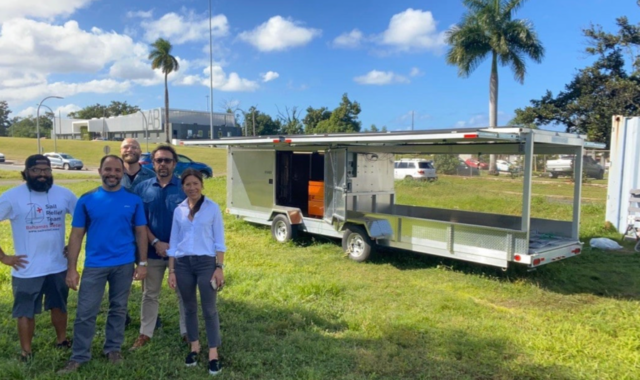
Two TAF’s were awarded this year to organizations pursuing mobile solar and battery storage systems. Footprint Project, a nonprofit organization that helps emergency responders deploy clean technologies during emergency response and disaster recovery, is working with NET Charter High School and University of New Orleans to develop a mobile solar+storage trailer that can be used in the event of an outage in New Orleans, Louisiana. The trailer would connect to a stationary solar+storage system at the University to charge and then be used in-the-field to support emergency response operations. In California, DignityMoves, a nonprofit seeking to create innovative support services for the state’s unhoused population, is working with the Clean Coalition, a nonprofit organization whose mission is to accelerate the transition to renewable energy through technical, policy, and project development expertise, to design a solar+storage system that can be used with temporary transitional housing structures. The system would move every 3-5 years with the housing and service facilities.
Completed Projects
To date, 21 TAF awards have resulted in installed solar+storage systems at 44 facilities, with many more projects in the pipeline. About a quarter of all TAF awards move forward to system installation. The primary reason projects are delayed or cancelled is economic infeasibility (to learn more about this, read the ‘Project Development Trends’ section). However, this year we heard from many partners that the biggest obstacle was delays in battery installation, either because the battery was backordered or because they had problems finding a battery storage installer that was available to complete the project. Some of the pipeline issues are likely related to COVID-19 disrupting the supply chain but the lack of developer availability is a new issue. Our partners reported that many developers weren’t interested in smaller projects, even if the organization had financing or cash-in-hand to complete the installation. In these instances, CEG worked with our regional networks to help understand why this issue was happening and to identify developers that could be referred for further support.
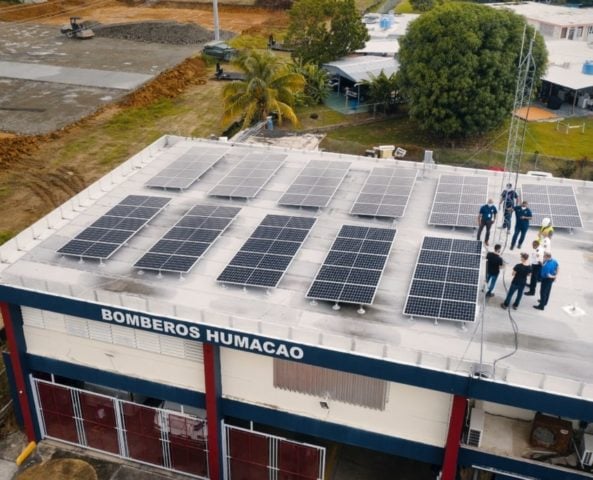
In the aftermath of Hurricane Fiona, several TAF-supported installations provided much-needed backup power for emergency responders in the lengthy blackout that followed. Solar Responders has a mission to provide solar+storage to Puerto Rico’s 96 fire stations. Since 2018, the organization has installed resilient power systems on 19 fire stations across Puerto Rico, which have produced over 4,000 hours of backup power. CEG supported the predevelopment process for three of these fire stations; Fire Station Humacao, Fire Station Yauco, and Fire Station Loiza. All the fire stations were able to remain operational during the outage. Fire Station Ponce, located in one of the hardest hit areas of Puerto Rico, was able to power critical loads including a refrigerator, lights, and the station’s communications equipment. The solar+storage system enabled Ponce firefighters to continue receiving 911 calls, responding to emergencies, and coordinating aid efforts from the fire station throughout grid outages. You can read more about Solar Responders’ projects here.
2022 Highlights: Resilient Power Leadership Initiative
The Resilient Power Leadership Initiative was awarded to two organizations this year. Both organizations are BIPOC-led and spearheading efforts to build resilient power capacity in their community. To date, CEG has awarded 17 RPLI’s. Almost 65 percent of awardees are BIPOC-led. 100% of RPLI’s have been awarded to BIPOC-led organizations since CEG committed to that goal in 2020.
This year’s awardees are:
- Feed the Second Line, New Orleans, LA: Feed the Second Line is a non-profit organization dedicated to supporting the culture bearers of New Orleans by building a more equitable city through job creation and individual support (such as purchasing groceries). The RPLI will support the Get Lit Stay Lit campaign, which “works to create a stronger hurricane safety-net for the people of New Orleans by leveraging pre-existing community resources: restaurants”, in bringing on a part-time community organizer. Part of the organizer’s work will be to 1) support restaurants as they explore and install solar+storage microgrids, and; 2) create a solar-job-training program for community members.
- United Parents Against Lead & Other Environmental Hazards (UPAL), Petersburg, VA: UPAL, a national nonprofit networking organization of and for parents of lead poisoned children, used their RPLI to train their first cohort of future solar installers. The cohort participated in the installation of solar panels at a historic USO facility, which now serves as a community training center and solar+storage resiliency hub. CEG also provided UPAL with a TAF to support a solar+storage assessment for the facility: solar has been installed and battery storage is slated for early next year.
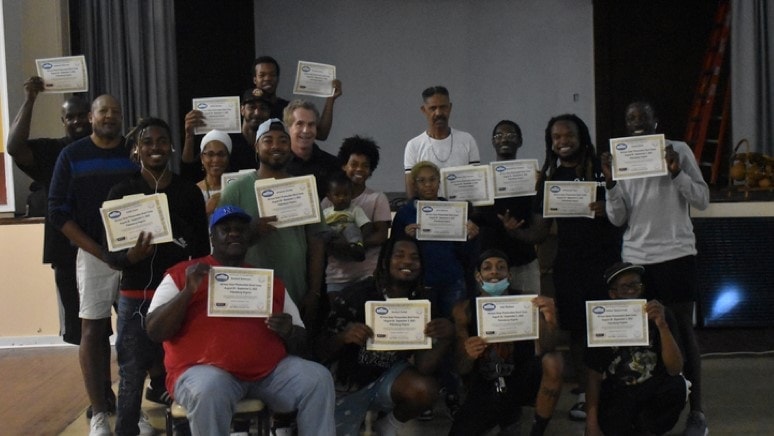
“We are thankful to Clean Energy Group for providing the technical assistance funds that made it possible for us to have a much needed feasibility study performed on our building. Clean Energy Group, through the Resilient Power Leadership Initiative, also funded UPAL’s inaugural Solar PV Installation training session held on August 29th through September 22, 2022. We graduated 20 individuals who will contribute to Virginia’s clean energy workforce.” – Queen Zakia Shabazz, Founder, UPAL
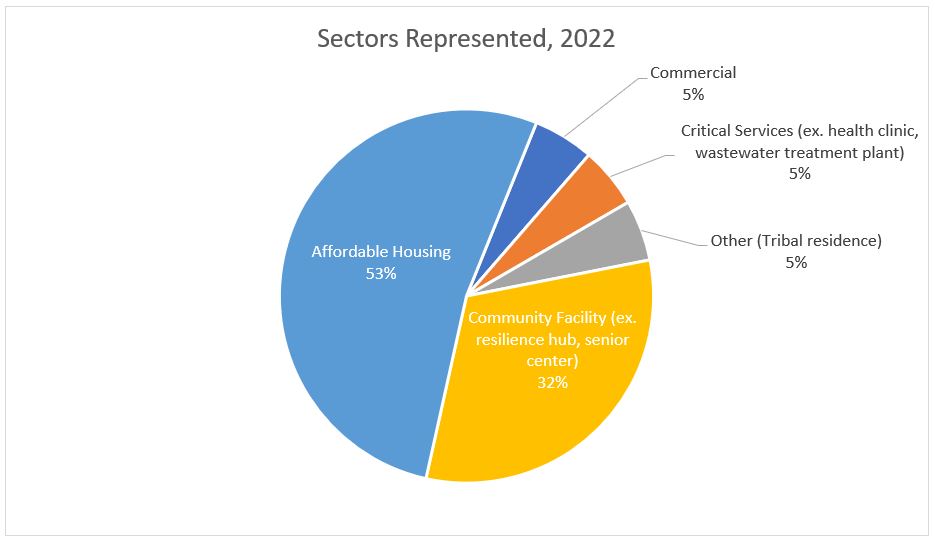
New Partnerships
This year, CEG developed new partnerships across several aspects of the TAF. These partnerships speak to how the TAF can have an impact beyond just the awardees. Through the TAF, CEG has been able to develop a network of mission-driven organizations, from state agencies to industry partners. Diversifying this network to better reflect the communities we serve is an ongoing goal for CEG and one we are committed to continuing in 2023.
CT Green Bank
In 2022, CEG partnered with Connecticut Green Bank to promote battery storage adoption among affordable housing communities through Connecticut’s new battery storage incentive, the Energy Storage Solutions program. The Energy Storage Solutions program provides upfront incentives for commercial, residential, and industrial customers to help reduce the cost of purchasing a battery system. Those enrolled in the program will also receive performance incentive payments based on the average power their storage project contributes to the grid during critical periods. There are additional incentives available for low-to-moderate income households and critical service providers.
Through the TAF, CEG provided one-on-one support and small grant funding for solar+storage feasibility assessments at four affordable housing properties in Connecticut. Two additional assessments, one at a revitalized former factory and another at an affordable housing campus, are soon to be awarded. CEG and the Green Bank also co-hosted a series of webinars aimed at overviewing the incentive program and discussing how resilience can support affordable housing communities.
CEG will continue our role as the Green Bank’s technical assistance partner for affordable housing providers through 2024.
Technical Partners
Engineering partners are a key part of the TAF, as they conduct the solar+storage assessments. Although some awardees already have an engineer in mind when they apply for the TAF, many do not and are unsure of where to look or who to engage. In these cases, CEG can connect awardees to one of our trusted engineering partners to conduct the feasibility assessment. For many awardees, the TAF process is their first step towards installing solar+storage, and having a mission-aligned technical expert, in addition to CEG, is invaluable.
For the engineering firms, the TAF can connect them with smaller community-serving institutions in communities that have been largely left out of the resilient power movement.
“When we began with CEG 6 years ago, the cost and complexity of getting started with resilient power systems put them out of reach for many communities,” said Geoff Oxnam, CEO & Founder of American Microgrid Solutions, one of CEG’s longtime feasibility assessment partners. “CEG’s TAF program overcame that hurdle and, today, we have helped more than 50 systems get started in some of the nation’s most vulnerable communities.”
For engineering firms with a more regional focus, particularly in areas with new or emerging battery storage markets, TAF-funded feasibility assessments can provide the necessary support to understand and develop innovative resilient power models.
Vito Greco, Director of Solar Programs for Elevate Energy, one of CEG’s newer feasibility assessment partners, said, “The Clean Energy Group’s Technical Assistance Fund has been critical in our ability to conceptualize and design solar, storage, and resilience hub projects in the Midwest. With their support, we have five projects in construction and many more in the pipeline.”
The clean energy space has traditionally been dominated by mostly white, male-owned engineering firms and developers. Recognizing this, CEG is working to expand our network of feasibility assessment partners both to better reflect the communities our awardees serve and expand the benefits of participating in TAF-funded feasibility assessments to more diverse businesses.
Thank you to all our technical assistance partners this year in providing quality solar+storage assessments, including: American Microgrid Solutions, Gemini Energy Solutions, Clean Coalition, Elevate, Footprint Project, JPHB Solutions, and muGrid Analytics.
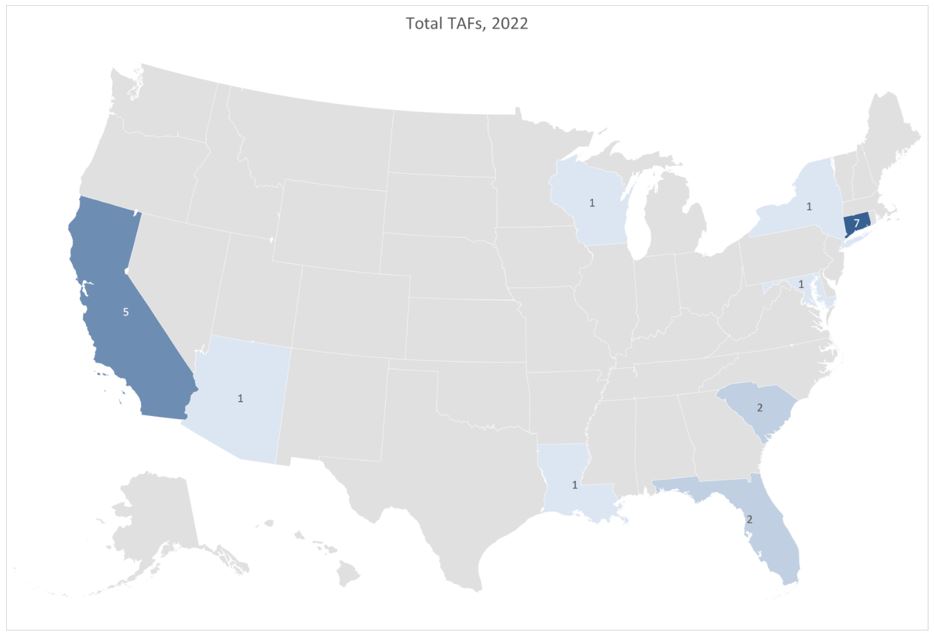
Regional Trends
CEG awarded TAFs to 21 organizations this year. The states with the highest number of awarded projects were California and Connecticut, which reflects the network CEG has built in those states. For example, CEG engineering partner Clean Coalition, and DignityMoves partnered on TAF-funded assessments for several DignityMoves housing communities. Similarly, CEG’s partnership with the Connecticut Green Bank and Connecticut Department of Housing and Urban Development created a strong pipeline of affordable housing projects.
Solar+storage in both Connecticut and California also benefits from strong economics. Through innovative incentives and utility programs, systems can be much more cost-effective when compared to other states. That being said, CEG awarded its first TAF’s to partners in Wisconsin and Louisiana this year. Neither of these states have strong incentive programs for solar or battery storage, but instead benefitted from the work of dedicated advocates to ensure solar+storage investments are made in their community. In Louisiana, a TAF was awarded to SPROUT New Orleans, to develop resilient cooling systems for local farmers to store produce. In Wisconsin, a TAF was awarded to the Solon Springs School District to develop solar+storage at a local high school.
The continued geographic diversity of TAF awardees since the programs launch in 2014 is evident now more than ever. States like California, New York, and Massachusetts were early adopters of supportive regulatory policies for battery storage, which is reflected in the number of TAFs we have awarded in those states over the years. However, more and more states are adopting supportive battery storage incentives, such as Connecticut. Even outside of supportive regulatory environments, weakened power grids and increasingly severe weather have made clean, reliable backup power a necessity in places like Puerto Rico, where CEG has awarded 9 TAFs, totaling almost $100,000 in technical support for 34 community facilities and emergency service providers.
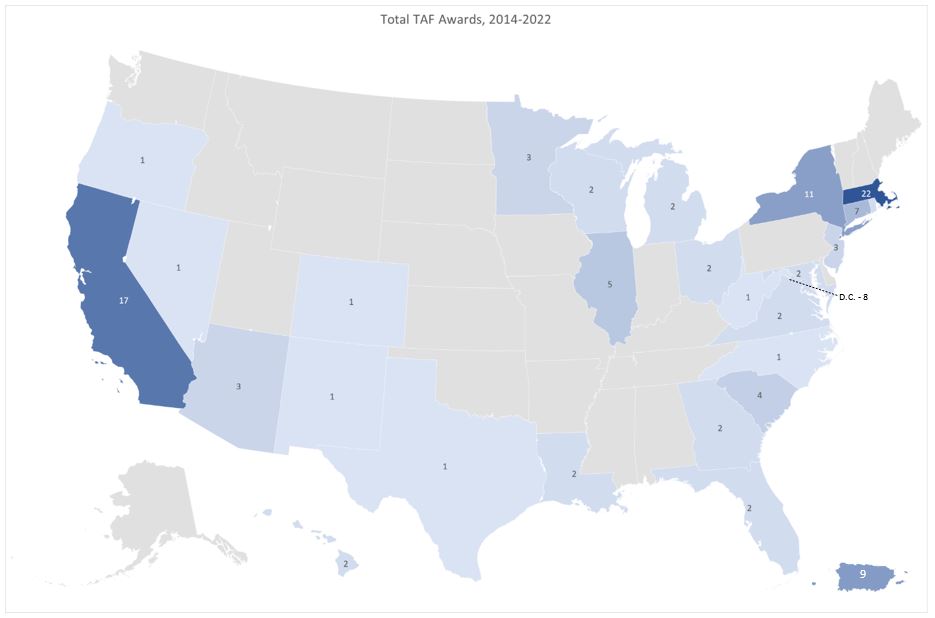
Project Development Trends
As we work to expand the reach of the TAF and award more projects than ever before, CEG has begun collecting more data on the types of projects seeking TAF awards, and the most common obstacles these projects encounter when getting off the ground.
Project Motivation
TAF applicants are asked to fill out a basic survey when applying for the TAF. As part of this survey, applicants are asked to rank their motivations for pursuing resilient power. Most of our applicants this year were looking at solar+storage as their primary resilient power source, with more than half of applicants citing resilient backup power for health and/or safety as their primary or secondary motivation. This speaks to the value solar+storage can bring, particularly to community-serving institutions, as a means of supporting vulnerable individuals within their communities, such as those with medical devices, during a power outage.
In addition to the choices listed in the survey, respondents could provide a short-answer response regarding their project motivation. Many of these entries spoke to how solar+storage can further goals not directly related to power generation, such as food security and providing shelter.
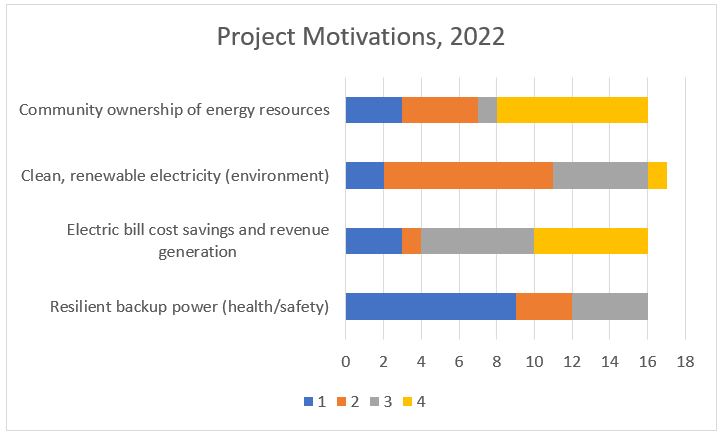
Obstacles to Development
TAF awardees are also asked to fill out an exit survey once the feasibility assessment has been completed. The purpose of this survey is not only to identify ways CEG can improve the TAF process, but to get a sense of what obstacles the project has encountered or will encounter as the awardee organization begins the development process. Of the TAF-funded feasibility assessments that were completed this year, limited economic feasibility was the number one obstacle to project development. This is especially telling when paired with the second most cited obstacle, a lack of financing options.
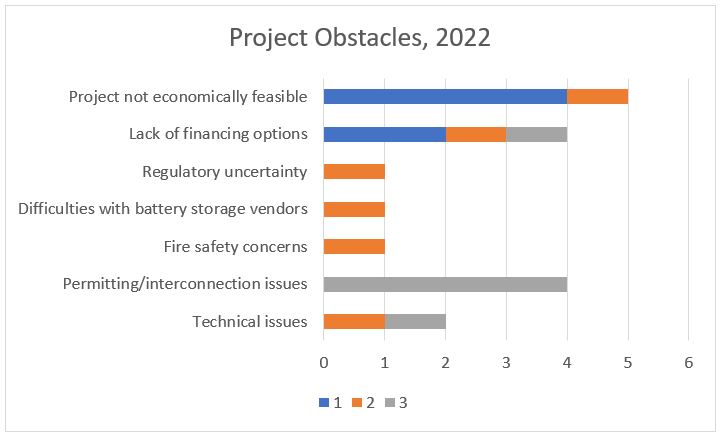
Looking to 2023
Clean Energy Group is committed to awarding 50 percent of TAF and 100 percent of RPLI funding to BIPOC-led organizations. Our priority for 2023 is to continue to expand our partnerships and better serve communities that face an uphill battle in accessing resilient power resources. Equitable distribution of solar and battery storage technologies continues to be a major issue for an industry that is seeing exponential growth. Through awareness building, policy advocacy, and technical assistance, CEG will continue to support the on-the-ground efforts of our grassroots partners in ensuring that solar+storage reaches the communities that need it the most.








